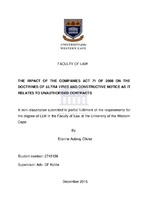| dc.description.abstract | An agent acting in excess of his authority creates several legal problems, particularly in company law. In South African law, like in many other legal systems around the world, the interplay between the doctrines of ultra vires and constructive notice has, historically, played a profound role in governing the relationship between a company, its representatives, and outsiders. For decades, the contractual capacity and consequent liability of companies have been guided by thorny and intricate legal principles. This issue has become especially intriguing in light of the changes to the company law regime introduced by the new legislation. The relevant sections of the Companies Act 71 of 2008 (the 2008 Act) that allow for the restriction of a company's powers, require close scrutiny and thoughtful consideration. To that end, this thesis shall examine some of the legal consequences arising from the conclusion by a company's agent of an "unauthorised contract". | en_US |

